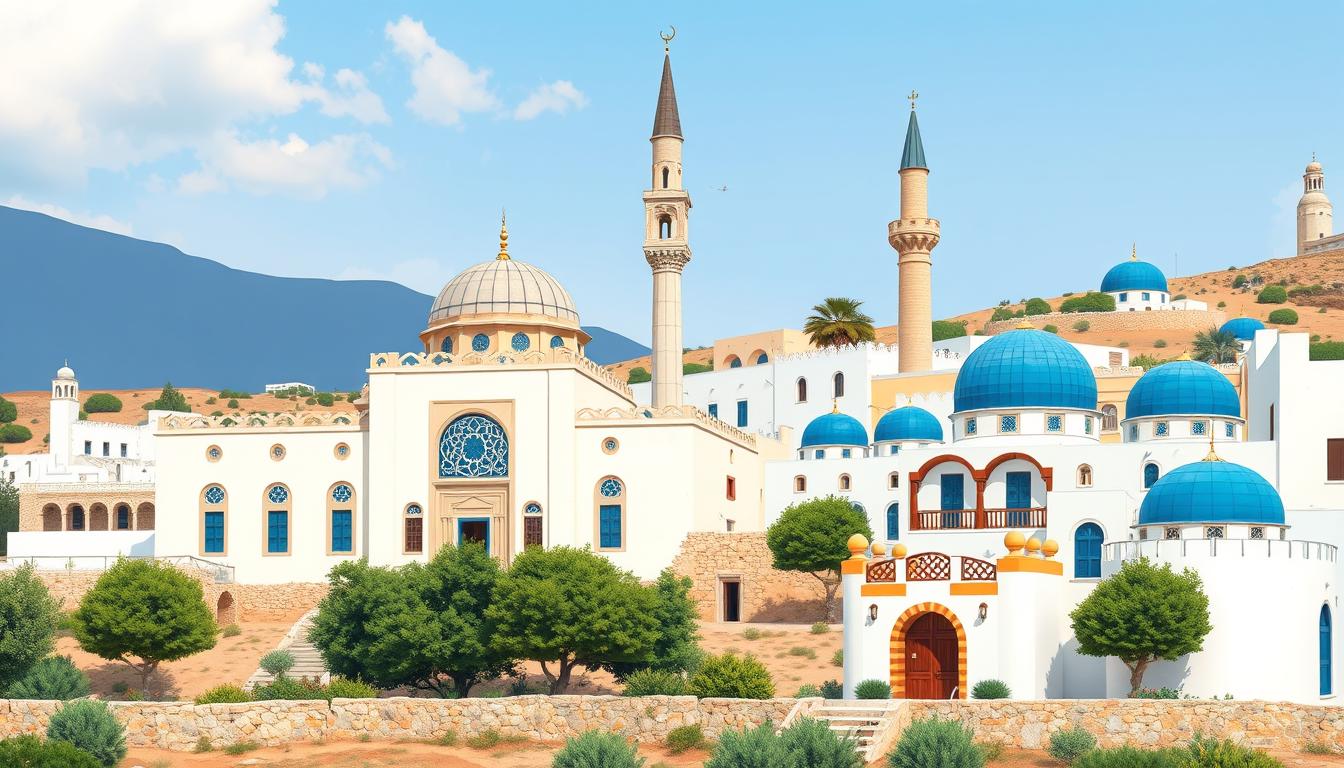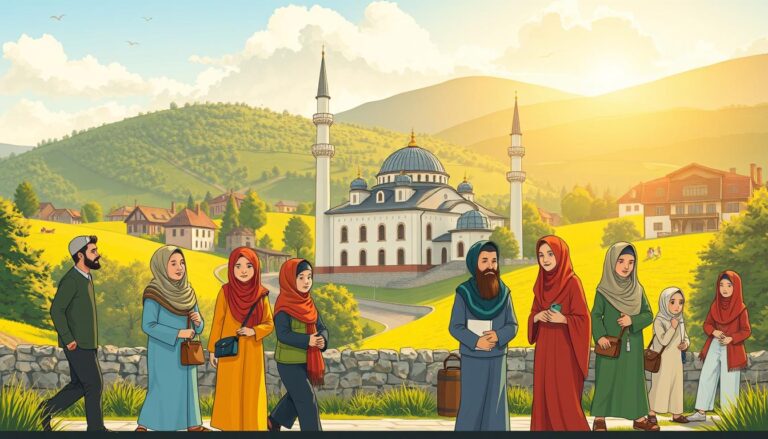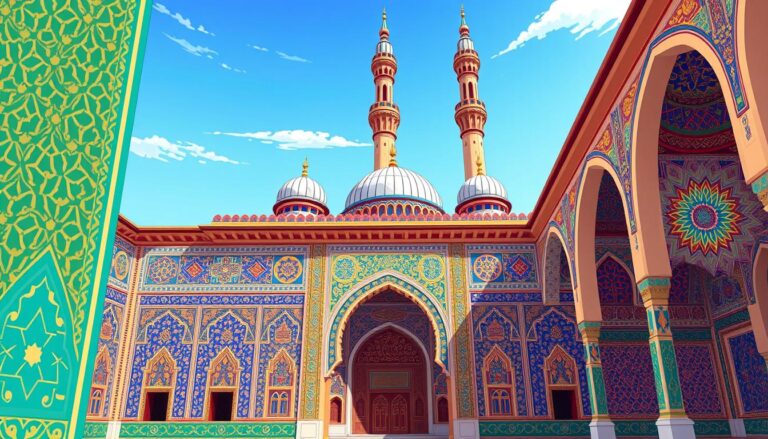Islam in Greece
According to official estimates, the Muslim minority population in Greece ranges from 98,000 to 140,000 individuals, making up between 0.9% and 1.2% of the total population. This diverse community includes ethnic Turks, Pomaks, Romani groups, and Greek Muslims, primarily residing in the regions of Western Thrace, Crete, Epirus, and western Greek Macedonia. The Muslim presence in Greece has deep historical roots, dating back to the Ottoman era, as well as more recent waves of immigration during the latter half of the 20th century.
Key Takeaways
- The Muslim minority in Greece is estimated to range from 98,000 to 140,000 individuals, or 0.9% to 1.2% of the total population.
- The Muslim community in Greece is ethnically diverse, comprising Turks, Pomaks, Romani groups, and Greek Muslims from various regions.
- The Muslim presence in Greece has a long history dating back to the Ottoman era, as well as more recent immigrant communities.
- The Muslim minority in Western Thrace is the only explicitly recognized minority group in Greece.
- Greece’s constitution ensures equality and prohibits discrimination against the Muslim minority, while also protecting religious freedom.
Introduction to Islam in Greece
Greece has a rich and diverse religious landscape, with the history of Islam deeply interwoven into its cultural fabric. The Muslim communities in Greece consist of different ethnic groups, including the Turks, the Pomaks (Muslim Slavs who speak Bulgarian), and the Muslim Roma, each with their own unique languages and cultural traditions. This diversity has been an integral part of the country’s identity for centuries.
Brief Overview of Muslim Communities
The presence of Muslims in Greece can be traced back to the Ottoman period, when they settled in the region of Western Thrace. This marked the birth of the Muslim minority in Greece, which has continued to thrive and evolve over the years. Following the Balkan Wars and World War I, Western Thrace became part of Greece, and the Muslim minority remained in the region, with the Treaty of Lausanne in 1923 providing for the status, protection, and rights of this community.
Historical Significance of Islam in Greece
The history of Islam in Greece is one of cultural exchange and integration. While the majority of the population adheres to Greek Orthodoxy, the Muslim minority has played a significant role in shaping the diversity in Greece and the Islamic culture in Greece. Over the centuries, the history of Islam in Greece has been marked by periods of coexistence and collaboration, as well as challenges and tensions, reflecting the complex and dynamic nature of religious and ethnic relations in the country.
“Islam has always ranked in the first place among all minority religions in Greece since 1830.”
The Muslim communities in Greece have continued to evolve, with the arrival of immigrant Muslims from different countries in the early 1990s further adding to the diversity in Greece. Today, the Greek Muslims constitute two primary groups: the “Old Muslims” (the historical Muslim Turkish minority) and the “New Muslims” (immigrant Muslims with diverse ethnic origins).
Muslim Minority in Western Thrace
The Muslim minority in Western Thrace is a unique and significant part of Greece’s cultural landscape. This region is home to three distinct ethnic groups: the Turks (Western Thrace Turks), the Pomaks (Muslim Slavs who speak Bulgarian), and the Muslim Roma. According to the Greek government, the Turkish speakers make up approximately 50% of the minority, the Pomaks 35%, and the Muslim Roma 15%.
Ethnic Composition and Demographics
The Muslim population in Western Thrace is estimated to be around 150,000, making it the only explicitly recognized minority in Greece. Before 1920, the Turkish Minority owned around 84% of the land in the area, but this percentage has decreased to below 25% currently. The region has roughly 2,000 minority students graduating from elementary schools annually, but the number of Minority secondary-high schools is only two.
Legal Status and the Treaty of Lausanne
The legal status of the Muslim minority in Western Thrace is enshrined in the 1923 Treaty of Lausanne, which exempted the “Moslem inhabitants of Western Thrace” and the “Greek inhabitants of Constantinople” from the population exchange between Greece and Turkey. However, the Greek government has taken several actions that have impacted the minority, such as unilaterally reducing the number of teachers assigned to minority schools and enforcing the “Law on 240 Imams” to appoint imams and religious instructors against the will of the Turkish Minority.
“The legal status of the Muslim minority in Western Thrace is enshrined in the 1923 Treaty of Lausanne, which exempted the ‘Moslem inhabitants of Western Thrace’ and the ‘Greek inhabitants of Constantinople’ from the population exchange between Greece and Turkey.”
Other Muslim Communities in Greece
While the Muslim minority in Western Thrace is the most prominent and recognized in Greece, the country is home to several other Muslim communities. The Pomaks and Romani Muslims are two such groups that have a significant presence in the country.
Pomaks and Romani Muslims
The Pomaks, a Slavic-speaking Muslim community, are primarily concentrated in the Rhodope Mountains of Western Thrace. They maintain a distinct cultural identity, with their own language, traditions, and way of life. However, the Pomak language is not taught at any level of the education system in Greece, making it challenging to preserve their linguistic and cultural heritage.
Similarly, the Romani Muslim community in Thrace is distinct from the predominantly Greek Orthodox Roma population found elsewhere in the country. This minority group has faced challenges in terms of integration and access to resources, mirroring the broader issues faced by the Muslim community in Greece.
“The Pomaks and Romani Muslims are important but often overlooked components of the diverse Muslim tapestry in Greece. Their unique cultural identities and traditions deserve recognition and support to ensure their continued vibrancy.”
These smaller Muslim communities, alongside the larger Muslim minority in Western Thrace, contribute to the rich cultural diversity of Greece. Understanding and addressing the needs of these groups will be crucial in fostering a more inclusive and harmonious society.
Islam in Greece
Greece is home to a diverse Muslim population, comprising different ethnic, linguistic, and social backgrounds. This includes the Pomaks, ethnic Turks, certain Romani groups, and Greek Muslims, particularly from Crete, Epirus, and western Greek Macedonia, who converted to Islam mainly in the 17th and 18th centuries.
According to the latest estimates, the Muslim community in Greece accounts for around 5.6% of the country’s total population. The largest concentration of Muslims is found in the northwest of Greece, with over 100,000 individuals of Turkish, Pomak, and Roma ethnic origins.
The city of Athens alone is estimated to have more than 300,000 Muslims, reflecting the diverse nature of the community. Muslims from various backgrounds, such as Arabs, Pakistanis, Indonesians, Filipinos, Sudanese, and Africans, gather at the Votanikos Mosque in Athens, which can accommodate up to 360 people in the men’s section and between 70 and 80 in the women’s prayer room.
Despite the presence of the official Votanikos Mosque, many Muslims in Greece continue to attend unofficial mosques located in basements and other unrecognized facilities throughout the country. This situation highlights the ongoing challenges faced by the Muslim communities in Greece in terms of building and obtaining recognition for their places of worship.
The Greek government’s decision not to include religious affiliation in its official census has contributed to the uncertainty surrounding the exact number of Muslims in Greece. Additionally, the presence of extremist groups and anti-Muslim sentiment, including challenges posed by groups like Golden Dawn, have further complicated the process of mosque construction and recognition in the country.
Overall, the Islamic culture in Greece is characterized by its diversity, reflecting the various ethnic, linguistic, and social backgrounds of the Muslim population in the country. While progress has been made in recent years, the Muslim community in Greece continues to navigate the complexities of religious representation and institutional recognition.
“The Greek authorities have recognized some previously unofficial mosques in recent years, while others remain in a state of limbo, depicting the complex scenario surrounding mosque construction and recognition in Greece.”
Religious Practices and Institutions
Greece, known for its predominant Greek Orthodox Christian population, also hosts a diverse religious landscape, including a significant Muslim minority. Among the religious practices and institutions within this community, mosques and Islamic seminaries play a vital role in preserving and nurturing the Islamic faith.
Mosques and Islamic Seminaries
In the region of Thrace, which is home to the largest Muslim population in Greece, there are approximately 270 imams and around 300 mosques. These religious institutions serve as the epicenters of the Muslim minority’s spiritual and communal life, providing a space for prayer, education, and cultural preservation.
Complementing the network of mosques, Greece also hosts two Islamic theological seminaries – one in Komotini and another in Echinos. These institutions play a crucial role in educating and training the next generation of Muslim religious leaders, ensuring the continuity of Islamic practices and traditions within the Greek context.
Education for the Muslim Minority
The Greek government has taken steps to support the educational needs of the Muslim minority in the country. This includes financing the transportation of students from remote areas to schools, as well as reserving 0.5% of the placements in Greek higher education institutions for members of the minority community.
These initiatives demonstrate the commitment to ensuring equal access to education and preserving the religious practices and cultural identity of the Muslim population in Greece.
Integration and Minority Rights
The Muslim minority in Greece enjoys full equality with the Greek majority, with the constitution prohibiting discrimination and ensuring freedom of religion. The minority is always represented in the Greek parliament, and during the 2002 local elections, approximately 250 Muslim municipal and prefectural councillors and mayors were elected.
Political Representation and Organizations
The main minority rights activist organization of the Turkish community within the minority is the “Turkish Minority Movement for Human and Minority Rights.” The Pomak community, on the other hand, is represented by the Panhellenic Pomak Association and the Cultural Association of Pomaks of Xanthi.
According to research polls, 81 to 90 percent of the population in Greece identifies as Greek Orthodox, while 4 to 15 percent identify as atheist, and 2 percent as Muslim. The Muslim minority in Western Thrace, which largely consists of descendants of the officially recognized Muslim minority according to the 1923 Treaty of Lausanne, numbers approximately 140,000 as of 2011.
Additionally, an estimated 520,000 Muslims, mostly asylum seekers, refugees, and migrants from various regions, are scattered throughout the country. These figures highlight the diversity and integration of the Muslim minority within the broader Greek society.
Challenges and Controversies
The Muslim minority in Greece faces significant challenges and controversies, particularly regarding the appointment of muftis and the application of Sharia law. The Greek government’s unilateral decision to appoint muftis, instead of allowing the Muslim community to hold elections, is viewed by the minority as a violation of the Lausanne Treaty, which grants them the right to organize and conduct their religious affairs freely.
Furthermore, Greece was the only European country that applied Sharia law to a section of its citizens against their wishes until the European Court of Human Rights ruled in 2018 that the mandatory application of Sharia law on the Muslim minority was a violation of the European Convention on Human Rights. This decision highlighted the challenges faced by the Muslim minority in Greece, where their religious and legal practices have been subject to government interference and controversy.
Appointment of Muftis and Sharia Law
The appointment of muftis, or Islamic legal scholars, has been a contentious issue for the Muslim minority in Greece. After the death of the Mufti of Komotini in 1985, the Greek government began appointing muftis instead of allowing the community to hold elections, a move that the minority views as a violation of the Lausanne Treaty’s guarantee of religious autonomy.
Furthermore, Greece’s application of Sharia law to the Muslim minority, even though it was the only European country to do so, has been a source of controversy. The European Court of Human Rights’ ruling in 2018 that this practice violated the European Convention on Human Rights was a significant victory for the Muslim minority, but the challenges they face in asserting their religious and legal rights continue to persist.
“The appointment of muftis and the application of Sharia law have been major sources of contention for the Muslim minority in Greece, as they view these practices as infringements on their religious autonomy and rights.”
Cultural Influences and Diversity
Greece’s cultural landscape is a tapestry of diverse influences, woven together over centuries. From the ancient Greek traditions to the impact of the Ottoman Empire, the nation has witnessed a remarkable interplay of cultural and religious identities. While Christianity, particularly the Greek Orthodox faith, remains the predominant religion, Greece has also embraced the cultural diversity brought by the presence of Muslim communities.
The Muslim minority in Greece, concentrated primarily in Western Thrace, comprises diverse ethnic and linguistic backgrounds. This includes the Turkish-speaking Turks, the Bulgarian-speaking Pomaks, and the Muslim Roma, each group with its unique cultural heritage and traditions. This diversity is a testament to the historical significance of Islamic culture in Greece and the influence of Islam in Greece over the centuries.
The cultural diversity in Greece extends beyond religion, with the country’s rich architectural legacy reflecting a harmonious blend of styles. From the iconic Parthenon, a symbol of ancient Greek beliefs, to the Byzantine-influenced structures that dot the landscape, Greece’s built environment showcases the intricate tapestry of its cultural past.
Furthermore, Greece’s artistic expression, particularly in the realm of cinema, has been shaped by the interplay of various cultural influences. The nation’s cinematic history boasts renowned directors and actors, who have brought the country’s diverse narratives to the global stage, enriching the international understanding of cultural diversity in Greece.
“Greece’s cultural diversity is a testament to its resilience, as it has embraced and celebrated the many facets of its heritage, fostering a vibrant and inclusive society.”
Religious Tolerance and Interfaith Relations
Greece has a long history of religious tolerance and coexistence between the Muslim minority and the Greek Orthodox Christian majority. Despite some challenges and controversies, such as the mandatory application of Sharia law, the overall relationship between these two religious communities has been one of mutual understanding and respect.
According to the latest data, around 2% of the Greek population identifies as Muslim, including the officially recognized Muslim minority in the region of Thrace and a growing number of immigrants and refugees. The Muslim population is estimated to be around 660,000, with the majority residing in the Attica region and the rest concentrated in Thrace.
Coexistence with Greek Orthodox Christianity
The Greek Orthodox Church remains the dominant religious institution in the country, with 81% to 90% of the population identifying as Greek Orthodox. However, the religious diversity in Greece extends beyond the Muslim minority, with a range of other faiths, including Old Calendarist Orthodox, Catholics, Protestants, Jews, and followers of polytheistic Hellenic religions, together making up less than 5% of the total population.
Despite occasional incidents of vandalism and discrimination, the Greek government and various stakeholders, including religious leaders and U.S. embassy personnel, have engaged in efforts to promote interfaith dialogue and protect religious freedom. These initiatives aim to foster greater religious tolerance in Greece and ensure the coexistence of Islam and Greek Orthodox Christianity for the benefit of all citizens.
“Greece has a long history of religious pluralism, and the coexistence of different faiths has been a hallmark of our society. We are committed to upholding the principles of interfaith dialogue and mutual respect.”
– Greek Minister of Religious Affairs
Impact of Immigration on Muslim Population
In addition to the established Muslim communities in Greece, there is also a growing Muslim immigrant population, mainly in Athens and Thessaloniki, who have arrived in the country in the last quarter of the 20th century. These new Muslim arrivals, coming from the Middle East, the Balkans, and North Africa, have added to the diversity of the Muslim population in Greece and will likely have a significant impact on the cultural and religious landscape of the country going forward.
According to recent statistics, the Muslim population in Europe was estimated at 25.8 million (4.9% of the overall population) as of mid-2016, up from 19.5 million (3.8%) in 2010. The Muslim population in Europe is projected to rise to 7.4% by 2050 in a “zero migration” scenario and could reach 14% by 2050 in a “high” migration scenario.
While immigration has contributed to the growing Muslim population in Greece, it’s important to note that the Muslim minority in Western Thrace ranges from 98,000 to 140,000 people, making up about 0.9% to 1.2% of the population. This established community has a distinct ethnic, linguistic, and social background that predates recent immigrant influxes.
The Muslim population in Greece is not homogeneous and consists of various ethnic, linguistic, and social backgrounds. Along with the Muslim minority in Western Thrace, there are also Pomaks and Romani Muslims residing in different parts of the country, adding to the diversity of the community.
“The Muslim community in some of the Dodecanese islands numbers around 3,000 individuals.”
As the Muslim immigrant population continues to grow in Greece, it will be crucial for policymakers and community leaders to address the challenges and opportunities presented by this demographic shift, ensuring social cohesion and respect for minority rights.
Conclusion
This comprehensive article has provided an in-depth exploration of the history, demographics, legal status, religious practices, and cultural influences of Islam in Greece. The country’s Muslim population comprises both long-established communities, particularly in Western Thrace, as well as more recent immigrant groups, creating a diverse and multifaceted landscape.
While there have been some challenges and controversies, such as the appointment of muftis and the application of Sharia law, the overall integration and coexistence of the Muslim minority with the Greek Orthodox majority has been relatively successful. The growing immigrant Muslim population will likely continue to shape the evolving role of Islam in Greek society, as the country navigates the complex dynamics of religious diversity and minority rights.
In summary, this article has offered a detailed summary of key points regarding the Islam in Greece, shedding light on the rich history, contemporary realities, and future prospects of this integral part of the country’s social and cultural fabric.
Source Links
- Islam in Greece
- Muslim minority of Greece
- Islam in Greece –
- Greek contributions to the Islamic world
- Turkish Minority of Western Thrace and the Turkish Community in the Dodecanese / Republic of Türkiye Ministry of Foreign Affairs
- A marginalised Muslim minority in Greece stands up against the government
- Islam and Muslim Brotherhood in Greece. – MENA Research Center
- Project MUSE – Explaining Away the Greek Gods in Islam
- A mosque for all seasons: Worshippers mark the third Ramadan at Athens’ Votanikos Mosque
- Greece – Religion, Mythology, Pantheon
- Religion in Greece
- National Profiles | World Religion
- Greece – United States Department of State
- Greece – Minority Rights Group
- GreeSE21
- No title found
- The state-sponsored mosque dividing opinion in Greece’s Muslim community
- Culture and Social Development
- Culture of Greece
- 2014 Report on International Religious Freedom – Greece | Refworld
- Greece – United States Department of State
- Greece – United States Department of State
- Europe’s Growing Muslim Population
- ISLAM IN GREECE • Equal Society
- Islam and Nationalism in Modern Greece, 1821-1940







